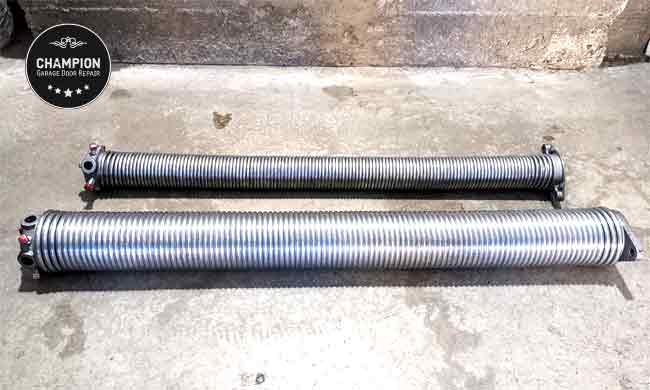A cautionary tale underscores the importance of due diligence when hiring garage door repair service providers. A woman in Brevard County was deceived by a garage door repair company that promised “hurricane-proof springs”.
Peggy Brigham, a resident of Malabar, Florida, found herself in a predicament when the torsion springs on her garage door broke, trapping her car inside. In desperate need of a quick solution, she searched on Google for garage door repair companies near her location and found one willing to come the next day. However, what started as a routine repair job took an unexpected turn when she was presented with a hefty price tag of over $2,000 for so-called “hurricane-proof springs.”
According to WFTV, garage door expert Doug Berlin from Above the Rest Doors was called in to assess the situation and promptly debunked the idea of “hurricane-proof springs.” According to Berlin, such springs simply do not exist. The springs sold to Peggy Brigham were standard and not engineered for hurricane resistance. He went on to explain that the repair for her garage door would have cost a fraction of what she paid—only $309, including labor and parts.
Wait, what? $300 for a spring replacement? Let’s pause here for a moment.
While $2,000 is certainly excessive for a standard garage door spring replacement, in today’s inflation and economic conditions, the average cost for fixing a garage door and replacing standard springs is around $550, while custom spring replacement may cost $1,500 or more. Many garage door repair companies may initially offer low prices to attract customers, only to raise prices or look for additional upselling opportunities later on. This practice is known as “bait and switch” and is quite common in the garage door repair industry.

Returning to the story, it adds another layer of intrigue when it’s discovered that the garage door repair company on Peggy Brigham’s invoice, “Lakeview Garage Repair,” couldn’t be found in state records. Likewise, the credit card payment was processed by a company called “Garage and Gates,” which also lacked proper registration as a Florida business.
The Better Business Bureau had previously issued a scam alert regarding these company names, reporting numerous customer complaints about subpar repair services and difficulties in reaching customer support. Additionally, these customers discovered that their invoices were linked to Lakeview Garage Repair.
When Jeff Deal, an investigative reporter from Action 9, attempted to contact the company, the representative on the other end couldn’t provide specific office details but confirmed that they were from “Lakeview Garage Repairs.” Deal confronted them about the exorbitant charges, but the person wouldn’t give their exact location, claiming that they are part of a call center located in Florida.
This story is an unfortunate and reoccurring example of dishonest business practices, enabled by failing search engines like Google and Bing. These cases involve Garage Door Services (GDS) of Texas, which deceived hundreds of consumers across the US, and Heritage Doors of Murrieta, CA, deceiving consumers in Huntington Beach, Orange County, and San Diego.
Google’s Fake Garage Door Repair Listings Strike Again
Peggy Brigham’s story serves as a reminder for regulators to amend Section 230 in order to hold online platforms more accountable for hosting misleading content and take proper actions against fake garage door repair companies.
It also highlights the importance of consumers being vigilant and well-informed when searching for a garage door repair company online. Garage door companies that engage in deceptive marketing techniques are more likely to deceive and overcharge their customers. Therefore, always ensure that the business is listed and has a local address near you.
Always verify the company’s information through official sources relevant to your location before providing personal information. For example, consumers in California can verify a company’s information on the CSLB (Contractors State License Board) website by searching for the company name or license number.








